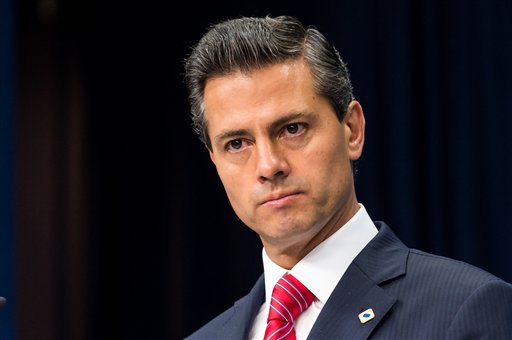Six years after he seduced Mexico with his dashing good looks and promises of sweeping reform, President Enrique Pena Nieto leaves a legacy stained by corruption, violence and human rights violations.
Charming his way to the presidency in 2012, his soap opera star wife by his side, Pena Nieto sold himself to voters as a fresh young reformer who would reinvent his party — the once-hegemonic Institutional Revolutionary Party (PRI) — and Mexico along with it.
The PRI had ruled Mexico as a one-party state from 1929 to 2000, until people grew so disgusted with its corruption, cronyism and abuses it had little choice but to allow free elections.
Twelve turbulent years later, Pena Nieto, then 45 years old, pulled off what once seemed unthinkable: returning the PRI to power, by promising to restore the stability of the old days but usher in a new era of democracy, transparency and reform.
It all started well for the youthful president with the sleek black hair, who had previously been governor of Mexico state, the country’s most populous: in rapid succession he passed landmark reforms in energy, education, telecommunications, labor and more.
The reforms, which touched virtually every aspect of Mexicans’ lives, were essentially a national make-over, designed to give the country a fresh new start and wash away the accumulated grime of seven decades of one-party rule.
‘George Clooney of politics’
Pena Nieto made a splash on the international stage, too: during an Asia-Pacific Economic Cooperation (APEC) summit in the Philippines in 2015, infatuated fans coined the Twitter hashtag #APEChotties for him and then-newly elected Canadian Prime Minister Justin Trudeau.
The Economist magazine urged Pena Nieto to “keep it up,” The Washington Post called him “handsome” and “popular,” and CBS News declared him “the George Clooney of politics.”
But as Mexicans prepare to cast their ballots again on July 1, the outgoing president’s popularity is hovering around 20 percent.
His chosen successor, former finance minister Jose Antonio Meade, appears to be on track for a drubbing, polling a distant third to fiery leftist Andres Manuel Lopez Obrador — who has a double-digit lead — and conservative Ricardo Anaya.
Where did it all go wrong?
Bad old days
It did not take long for signs to appear that the bad old days of the PRI were alive and well.
Even as the ink was drying on Pena Nieto’s reforms, he and the party were getting mired in a succession of scandals.
In 2014, investigative journalists revealed his wife had bought a multi-million-dollar mansion from a government contractor in a suspected sweetheart deal.
Then came the string of corruption scandals involving PRI governors, no less than 11 of whom are now on trial, in jail, under investigation or on the run.
The headaches got worse when the drug lord Joaquin “El Chapo” Guzman escaped from maximum-security prison in 2015.
Though he was recaptured the following year and extradited to the United States, the episode remains a major embarrassment.
Missing students, murders
The darkest stain, however, may be the disappearance of 43 students in the southern state of Guerrero in 2014.
The student activists went missing after a clash with local police, in circumstances that remain murky.
Mexican authorities say corrupt police handed them over to drug cartel hitmen who killed them and burned their bodies.
But a team of independent international forensic investigators who examined the supposed bonfire site insists that version of events is impossible — leaving Mexicans to wonder what truth could possibly be worse than the alleged cover-up story.
More generally, the violence Mexico is suffering has badly battered Pena Nieto’s image.
Awash in bloodshed driven by the war on drug cartels, Mexico registered a record 25,339 homicides last year.
“He’s been a total failure” on security, said political analyst Sergio Aguayo of the Colegio de Mexico.
“Mexicans can hardly agree on anything, but there’s rare consensus on one fact: Enrique Pena Nieto’s security policy was a failure.” /vvp
